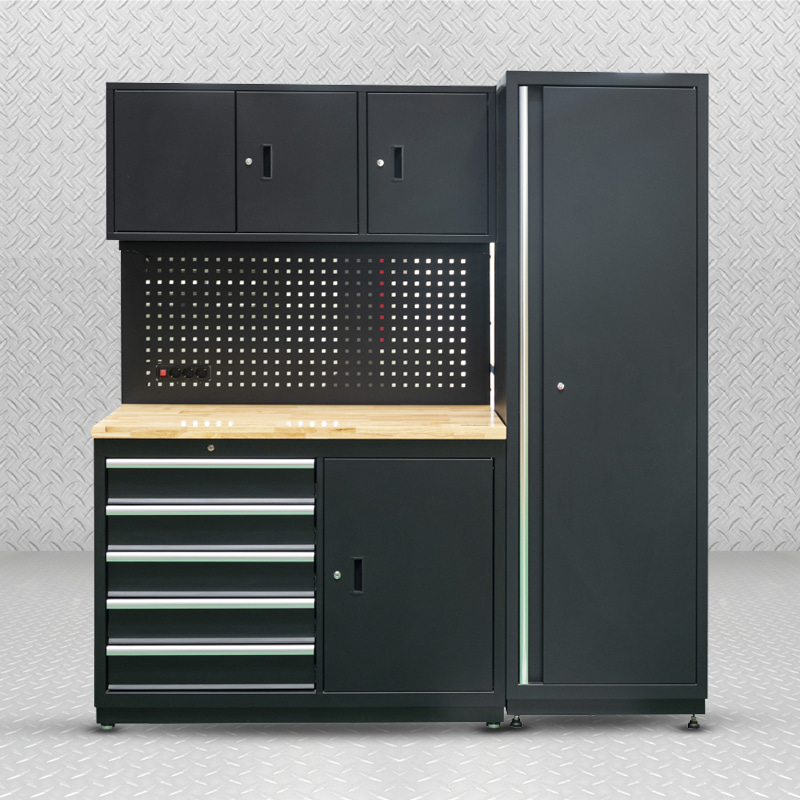As sustainability becomes a key driver in manufacturing, Garage Storage Cabinet system producers are adopting eco-friendly materials, energy-efficient processes, and waste-reducing techniques. Here are the major trends shaping the sustainable production of workshop and garage storage cabinets:
1. Use of Recycled and Sustainable Materials
Recycled steel and aluminum are being increasingly used, with many manufacturers shifting to high-recycled-content steel to reduce energy-intensive virgin metal extraction. Aluminum alloys derived from recycled sources help cut CO₂ emissions and enhance material reuse.
For wood-based storage systems, there is a growing preference for sustainably sourced materials such as FSC-certified wood, ensuring responsible forestry practices. Bamboo-based panels are also gaining popularity as a renewable, fast-growing alternative to traditional wood.
Advancements in coating technologies include water-based powder coatings with low or no volatile organic compounds, which reduce air pollution compared to traditional solvent-based paints. Bio-resin coatings derived from plant-based sources offer a non-toxic, biodegradable option.
2. Energy-Efficient and Low-Waste Manufacturing
Laser cutting and robotic welding improve material efficiency by reducing scrap waste, while AI-driven optimization ensures minimal material waste during metal cutting and panel fabrication. Manufacturers are increasingly adopting on-demand production methods, which minimize overproduction and storage waste. Modular designs allow customers to assemble storage solutions with fewer components, reducing manufacturing complexity.
Some production facilities are transitioning to solar-powered energy systems, reducing reliance on fossil fuels. Heat recovery systems in powder coating processes improve energy efficiency, further decreasing the environmental impact of manufacturing.

3. Circular Economy and End-of-Life Recycling
New designs prioritize easy disassembly so individual parts can be reused, repaired, or recycled rather than discarded. Bolt-free or snap-fit systems reduce reliance on adhesives and welding, making recycling more efficient.
Some manufacturers are introducing buy-back and recycling programs, encouraging customers to return old cabinets for proper recycling. Components are being designed to be easily separated into recyclable material streams.
In packaging, there is a shift toward plastic-free, recyclable cardboard alternatives instead of traditional plastic wraps and foam inserts. Some companies are using upcycled industrial waste, such as repurposed textile or paper pulp, for protective packaging.
4. Smart and Multi-Functional Storage Solutions
Space-efficient modular systems are becoming more common, allowing users to expand storage only when needed, reducing unnecessary production. Some garage cabinets now integrate motion-sensor LED lighting, reducing electricity consumption. Passive ventilation designs are also being introduced to minimize the need for climate control in high-humidity environments.
5. Compliance with Green Certifications and Regulations
Many manufacturers are obtaining ISO 14001 (Environmental Management) and LEED (Leadership in Energy and Environmental Design) certifications to ensure sustainable production and minimal environmental impact.
To comply with environmental regulations such as REACH (EU) and RoHS (Restriction of Hazardous Substances), manufacturers are eliminating hazardous substances like lead, cadmium, and phthalates in coatings, adhesives, and materials.

 ENG
ENG  English
English Deutsch
Deutsch











 +86 (0)512-5297 3238
+86 (0)512-5297 3238 +86 (0)512-5297 3239
+86 (0)512-5297 3239 info@chinagoldenline.com
info@chinagoldenline.com  No.58, Yangguang Avenue, Yushan High-tech Industry Zone, Changshu City, Jiangsu, China.
No.58, Yangguang Avenue, Yushan High-tech Industry Zone, Changshu City, Jiangsu, China.

